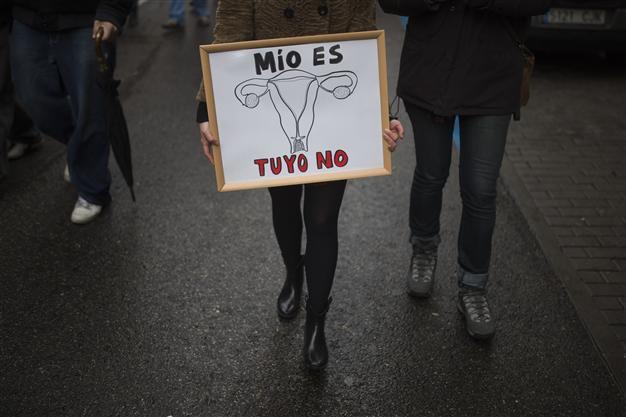UN urges states to remove ‘unnecessary’ restrictions on abortion
ISTANBUL

A protestor carries a banner reading 'It is mine, not yours' during a protest against the Spanish government's plan to implement major restrictions on abortion in Madrid, Feb 8. AP photo
The United Nations has urged states to remove “unnecessary restrictions on abortion” and provide access to safe abortion services, in a report by the U.N.’s International Conference on Population and Development (ICPD) 2014.“The fundamental rights to life and to security of the person, as well as freedom from cruel and inhumane treatment, and from discrimination, among others, means unnecessary restrictions on abortion should be removed and governments should provide access to safe abortion services, both to safeguard the lives of women and girls and as a matter of human rights of: respect, protection and fulfillment, including the right to health,” the ICPD said in its report.
The report also stated that “in all cases where abortion is not against the law, it must be safe,” adding that concrete measures were urgently needed to ensure all women have ready access to safe, high-quality abortion services. “The more restrictive legislation on abortion is, the more likely abortion is to be unsafe and to result in death,” it said, citing the World Health Organization (WHO).
An estimated 8.7 million young women aged 15 to 24 in developing countries resorted to unsafe abortions in 2008, despite the considerable advances in maternal and child health and family planning in the past two decades, said the report.
It also recalled that the vast majority of governments allow abortion on request, or to save the life of the woman, or for at least one other condition such as fetal anomaly.
States must take measures to reduce unplanned pregnancies by increasing access to contraception and fulfilling the rights of women and girls to remain free from forced or coerced sex and other forms of gender based violence, said the report, also adding that they must ensure access to quality post-abortion care for all persons suffering from complications of unsafe abortion.
The report also underlined the significance of the access to sex education among adolescences, as well as to contraception methods to decrease the need for abortion.
“States should strive to eliminate the need for abortion by providing universal access to comprehensive sex education starting at adolescence, and sexual and reproductive health services, including modern methods of contraception, to all persons in need; by providing widespread affordable access to male and female contraceptive, and timely and confidential access to emergency contraception; by implementing school and media programs that foster gender-equitable values and couple negotiations over issues of sex and contraception; and by respecting, protecting and promoting human rights through the enforcement of laws that allow women and girls to live free from gender based violence,” it stated.
About 70,000 adolescents in developing countries die annually of causes related to pregnancy and childbirth. Nine out of ten births in girls below age 18 occur within early marriage. In total, 800 women a day died from causes related to pregnancy or childbirth in 2010.
The report also urged governments to promote women’s empowerment and gender equality, which is key in preventing and responding to gender-based violence.
It said gender equality can affect the risk of abortion by shifting social expectations for more couple conversations about contraception, by the repeal of discriminatory laws such as spousal authorization laws, or through stronger laws that reduce the threat of intimate-partner violence.
















